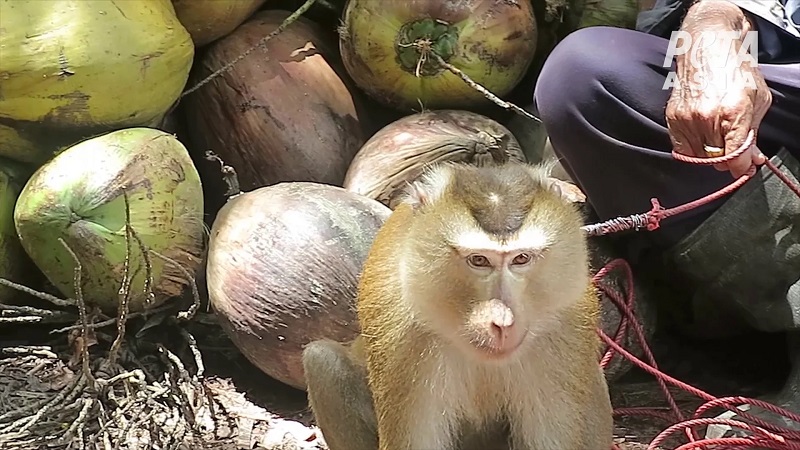Forcing chained monkeys to pick coconuts is not widespread and part of local culture, the agriculture sector has responded to a growing international ban over the practice.
After stores in the United States and Europe joined a boycott of Thai coconut products called by the People for the Ethical Treatment of Animals, or PETA, Nukul Look-in, president of the Thai Coconut Farmers Association, said that most coconut harvesting does not involve abusing or forcing monkeys to pick them.
According to Nukul, only a slice of all coconut products – 10% – are harvested with monkey labor, specifically from coconut trees over 25 meters tall.
The Commerce Minister Jurin Laksanawisit also spoke out as well to deny the allegations. He said using macaques to pick coconuts is a way of life in the south, while a small number are used to attract tourists.
“Coconut-picking by monkeys on an industrial scale does not exist in Thailand,” Jurin said. “Most of them you see are for lifestyle, culture and tourism.
Jurin said today he would meet PETA representatives to discuss the topic as the allegations will significantly harm the sale and export of coconut products.
On Saturday, PETA released a video showing chained and distressed monkeys and a statement calling for the global boycott of Thai coconut products – including top producers Aroy-D and Chaokoh – for abusing and exploiting the monkeys.
“A disturbing PETA investigation reveals that terrified young monkeys in Thailand are kept chained, abusively trained, and forced to climb trees to pick coconuts that are used to make coconut milk, meat, flour, oil and other products,” PETA wrote in a statement.
The animal rights group said it visited eighth farms where monkeys were forced to pick coconuts, and that some monkey-training facilities put on coconut-picking competitions.
Thousands of retailers have already agreed to remove the products: more than 9,000 Walgreens in the United States; 2,700 Boots stores in the United Kingdom and Thailand; as well as nearly 900 Albert Heijn stores in the Netherlands.
Related
Zoo ordered to stop sending chimp on bike to spray disinfectant





Reader Interactions